The best local listings management tools help businesses stay visible, accurate, and competitive across Google, Apple Maps, Yelp, and other search platforms.
Summary
The best local listings management tools keep your business information consistent, up-to-date, and optimized across hundreds of platforms, boosting local SEO, protecting brand reputation, and driving real results. In 2026, these tools go far beyond manual updates. They use AI to monitor listings in real time, correct inaccuracies automatically, and surface insights to improve your online presence at scale. Birdeye leads this evolution with its AI-powered Listings Agents, trusted by thousands of businesses to generate over 3 billion impressions and 200 million website visits each year.
In this post, we will examine the 15 best local listings management tools available in 2026 to help businesses maintain visibility, accuracy, and competitiveness across every location they serve.
Table of contents
- What is listings management software?
- Why accurate local listings matter
- Key features to compare in listings software
- The 15 best local listings management tools (2026)
- How to choose the right local listings management tool
- Frequently asked questions on the best local listings management tools for 2026
- Birdeye: The AI-powered listings platform leading 2026
What is listings management software?
Listings management software centralizes and automates the process of updating and maintaining accurate business information, including their name, address, phone number (NAP), hours, and other location details, across online directories, maps, and search platforms. Instead of updating each platform individually, users manage all listings from a single dashboard.
With numerous channels influencing local discovery, incorrect or outdated information can result in missed opportunities. Listing tools help reduce errors, support consistency, and improve how businesses appear in search results.
Core function and data sources
Listings management software collects NAP data and pushes it to various platforms, including Google Business Profile, Yelp, Bing, Apple Maps, Facebook, and relevant niche directories. This enables businesses to maintain key information consistency across multiple sources wherever prospects/customers search.
To make this process seamless, most tools integrate with internal systems, such as CMS platforms, point-of-sale software, and CRMs. Some also offer API connections, so updates made in one place sync automatically across all listings.
As more businesses prioritize consistency and accuracy in local search visibility, the demand for these tools continues to grow. The global business software and services market is projected to reach USD 1,153.75 billion by 2030, growing at a CAGR of 12.1% from 2025 to 2030. This growth reflects the increasing demand for listing management tools that support data consistency, customer access, and operational efficiency.
How AI and Voice Search have changed listings
Artificial intelligence has enhanced the management of listings by automating tasks that once required manual oversight. AI can identify gaps, correct errors, suggest improvements, and apply updates based on trends or competitor benchmarks.
Generative AI takes this a step further, creating optimized business descriptions, suggesting relevant categories, and drafting review responses that stay true to brand tone and compliance. This not only saves time but ensures every update and interaction remains consistent across platforms.
Voice assistants have also reshaped how people search. Over half of consumers (58%) use voice to find nearby or local businesses, and these voice platforms depend on accurate, structured data from business listings.
Do you know?: Platforms like Birdeye include features that ensure listings appear correctly in voice search results- an advantage we’ll explore further in the upcoming tool reviews below
Why accurate local listings matter
Accurate business listings are essential for local visibility, customer trust, and operational control, especially for multi-location brands. Incorrect or outdated details can harm your local SEO performance, confuse potential customers, and lead to brand inconsistencies across platforms.
Local SEO visibility and Map Pack rankings
To rank in the Google Map Pack, businesses need to satisfy three key algorithm factors:
- Proximity to the searcher
- Relevance to the search query
- Prominence, which reflects your business’s reputation and online presence
One of the strongest signals for prominence is NAP (Name, Address, Phone Number) consistency. In fact, businesses with consistent NAP data see up to 23% more Map Pack impressions than those with conflicting or outdated listings.
As a Local SEO expert says:
“Listings consistency is the cost of entry to local SEO.”
Without it, businesses struggle to gain visibility, even with good reviews or strong content.
Customer trust and on-site conversions
Customers expect the information they see online to be accurate. When hours, contact details, or locations are wrong, they often abandon the business entirely. A study found that conversion rates drop by up to 16% when business hours are incorrect.
For example, Birdeye Listings AI Agents helped Chartway Credit Union, headquartered in Virginia Beach, generate over 1,000 website visits per month directly from Google Listings. This shows how accurately AI-managed listings can significantly boost online traffic.
Multi-location compliance and brand consistency
For franchises and enterprise brands, listings management is not just about visibility; it’s about control. Managing bulk edits, maintaining visual consistency, and ensuring location-level compliance are daily challenges.
Inconsistent data across platforms can lead to ranking penalties or customer confusion, making audit trails and update logs essential for risk management. For instance, Moss & Company, a property management firm with 300+ locations, used Birdeye Listings to sync all their location information across multiple platforms. This ensured accurate, consistent listings, improved online visibility, and simplified compliance management.
Key features to compare in listings software
Choosing the right local listings management tool depends on how well it supports the day-to-day needs of your business. From syncing accuracy to review response automation and ROI tracking, the right features can make or break your local strategy.
Below are the core capabilities to evaluate when comparing listings software in 2026.
Automated sync and duplicate suppression
One of the most essential features of any listings tool is the ability to sync your business data across directories automatically and reliably, frequently and consistently. Automated sync ensures that updates to hours, phone numbers, or addresses are reflected across platforms such as Google, Yelp, Apple Maps, and Facebook without requiring manual effort.
Another key function is duplicate suppression, the automatic detection and merging of repeated listings that could confuse search engines or customers. Advanced platforms now use machine learning to identify duplicate entries based on business names, addresses, and even user behavior, outperforming older tools that rely on manual flagging.
When comparing platforms, look at how often they sync data:
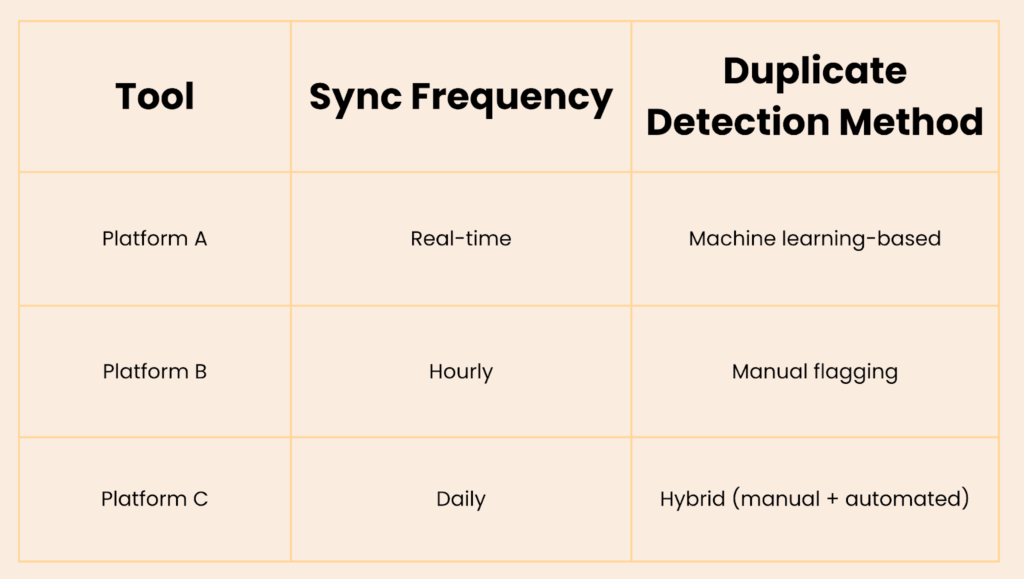
Understanding how each platform handles sync frequency and duplicate suppression can help avoid inconsistencies that impact rankings and visibility.
Review management and social integration
Modern listings software goes beyond just location data. Top platforms combine review management with social posting tools, providing businesses with a streamlined way to monitor customer feedback and engage with audiences locally.
For example, Birdeye offers an AI-powered response generator, enabling businesses to craft personalized responses to online reviews quickly. Meanwhile, BrightLocal features a Google Business Profile Post Scheduler, making it easy to maintain a consistent social presence without leaving the platform.
Integrated review management and social posting tools save time, improve reputation, and support local SEO by keeping profiles active and responsive.
Analytics, reporting, and ROI tracking
Listing tools should also offer deep reporting features to help you track performance and prove ROI. Must-track KPIs include:
- Impressions
- Clicks
- Calls
- Driving direction requests
- Revenue attribution (if supported)
Top-tier platforms enable you to export reports in multiple formats (PDF, CSV, or via API) and support multi-location roll-ups, allowing enterprise teams to evaluate performance at the location, regional, or national level.
With the global business intelligence software market forecast to reach USD 86.69 billion by 2030, data-driven decision-making is more critical than ever, and your listings tool should support that strategy.
The 15 best local listings management tools (2026)
To find the right fit, we evaluated leading platforms based on features, pricing, automation, integrations, and usability for different business sizes. From multi-location enterprises to solo business owners, each software on this list offers a unique set of strengths for local SEO success in 2026.
Below is a comparison table to help you quickly understand which local listings management tools align with your goals.
| Tool | Pricing (Starting) | Best For | Standout Feature |
| Birdeye | Custom | Multi-location brands | AI-powered Listings, Reviews, Social |
| BrightLocal | $35/month | Agencies, consultants | GBP Post Scheduler, white-label reports |
| Moz Local | $14/month | SMBs | Auto-duplicate removal |
| Yext | $199/year/location | Enterprises | Knowledge graph + voice search support |
| Uberall | Custom | Franchises | Bulk edits, Alexa integration |
| Whitespark | Pay-per-service | Local SEO pros | Manual citation audits |
| Advice Local | Custom | Global enterprises | Multilingual sentiment analysis |
| Reputation | Large multi-location brands (franchise, retail, restaurants) | Custom pricing (typically $249+/month) | Large multi-location brands (franchise, retail, restaurants) |
| Semrush LM | $20/month (add-on) | Semrush users | Heat map & keyword visibility |
| Thryv | $20+/month | SMBs | All-in-one dashboard w / listings |
| Synup | Custom | Multi-location brands | Schema markup + analytics widgets |
| SOCi Listings | Custom | Franchise brands | Approval workflows, compliance controls |
| Localo | $29/month | Local business owners | AI GBP posts, local keyword tracking |
| LocalFX | Custom | Agencies using WebFX | Built – in to WebFX marketing ecosystem |
| ReviewTrackers | $69/month | Reputation teams | Built to WebFX marketing ecosystem |
1. Birdeye
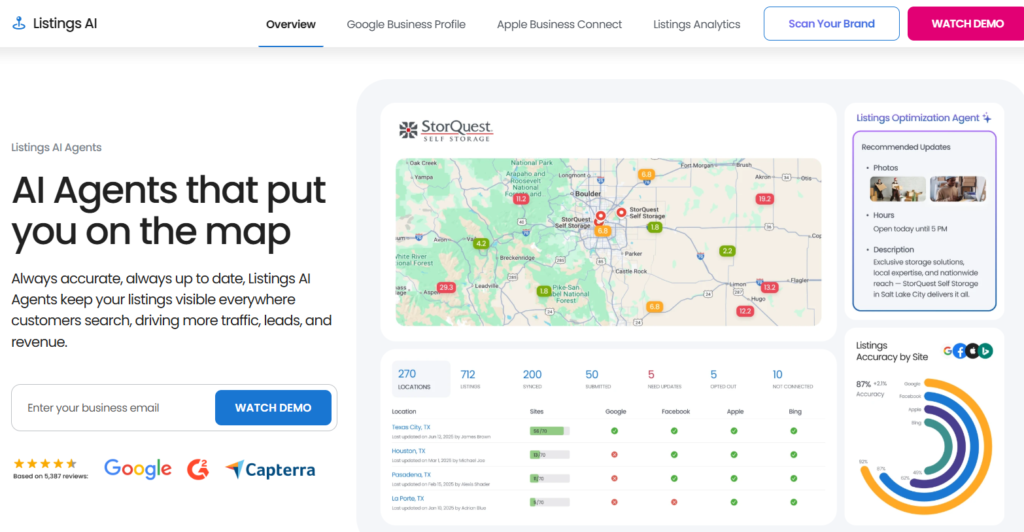
Birdeye leads the pack with an AI-powered platform that unifies listings, review management, and social posting in one intuitive dashboard, trusted by 200,000+ businesses worldwide. It’s built for multi-location brands that need scale without sacrificing accuracy.
Top features:
- Birdeye combines Listings, Reviews, and Social Media management into a single AI-powered dashboard built for multi-location businesses.
- Real-time sync to 100+ directories (including Google, Apple Maps, Yelp, and Facebook) ensures your business information is always accurate and visible.
- AI-powered Listings Optimization Agent continuously scans your profiles and competitors to identify gaps, errors, and missed opportunities in real time.
- Machine-learning-based duplicate suppression automatically detects and removes redundant listings to maintain a clean, authoritative online presence.
- AI-generated review responses help businesses reply to customer feedback quickly and consistently while maintaining brand tone.
- Birdeye Search AI boosts local search visibility by analyzing search intent, identifying ranking opportunities, and recommending AI-driven improvements to your business profiles.
- AI-assisted social content generation enables businesses to create and schedule engaging posts across multiple platforms with minimal effort.
- Built-in approval workflows and brand guardrails give teams control over what the AI publishes while reducing manual work.
- Unified analytics and reporting across listings, reviews, and social performance help you track engagement and visibility by location.
A Birdeye client shared,
“We cut manual listing updates by 90%, freeing our team to focus on growth.”
From visibility to reputation, Birdeye brings everything together under one roof.
2. BrightLocal
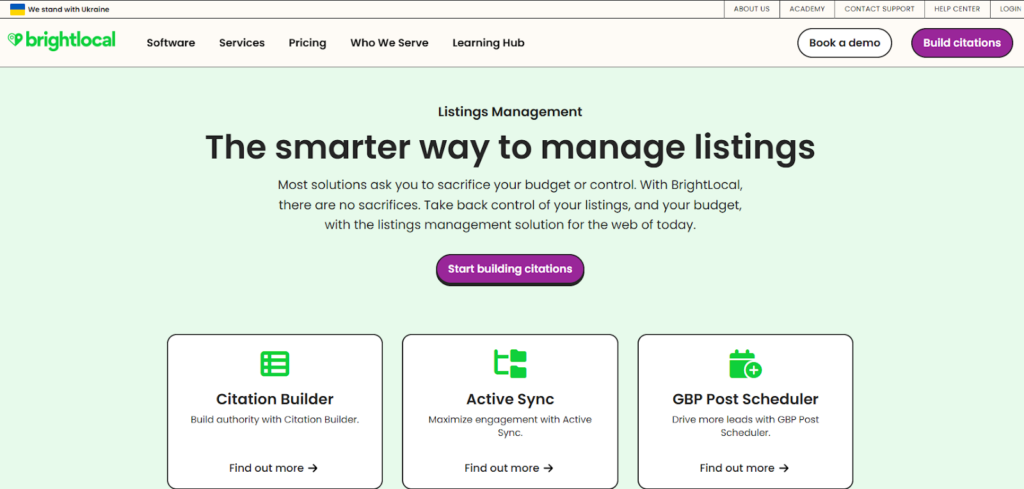
BrightLocal is a go-to platform for SEO agencies, freelancers, and consultants who manage listings for multiple clients. Priced from $35/month, it strikes a balance between affordability and useful features.
Top features:
- Google Business Profile (GBP) Post Scheduler
- White-label client reporting
- Manual citation building and audits
- Local SEO audit tools
BrightLocal is a solid pick for agencies and freelancers who want affordable local SEO tools and manual citation control. However, its reliance on manual updates and limited automation can slow down multi-location management. For faster, AI-powered listings with real-time syncing, Birdeye delivers greater efficiency and accuracy at scale.
3. Moz Local
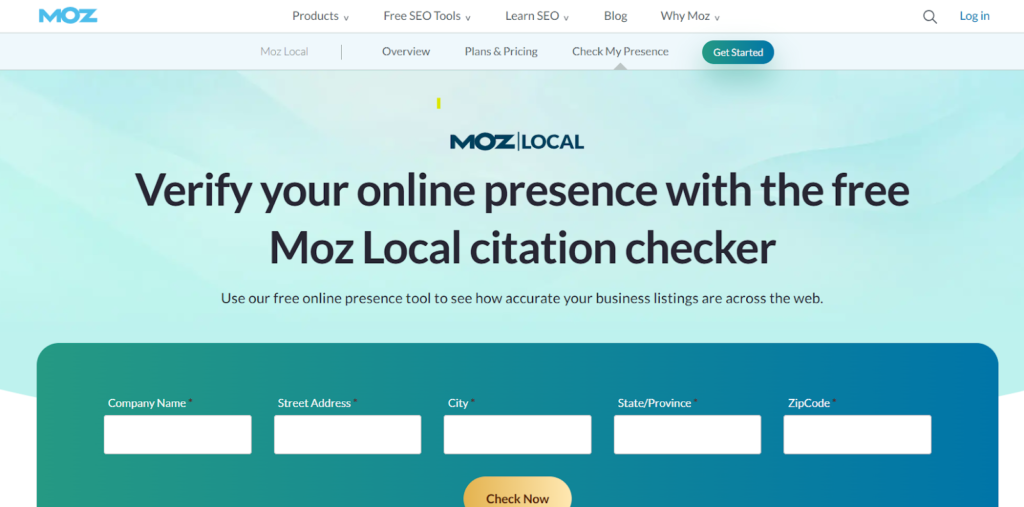
Moz Local is a simple yet powerful tool designed for small businesses looking for affordable, no-fuss listings management. Starting at just $14/month, it’s one of the most budget-friendly solutions available.
Top features:
- Automatic duplicate suppression
- Directory sync to major platforms
- Real-time update monitoring
- Basic review alerts
Moz Local is a budget-friendly tool that automates listing distribution and duplicate suppression for small businesses. However, it offers limited directory coverage and lacks AI-driven insights or advanced reporting. For smarter automation and deeper visibility, Birdeye provides real-time optimization and unified analytics across all locations.
4. Yext
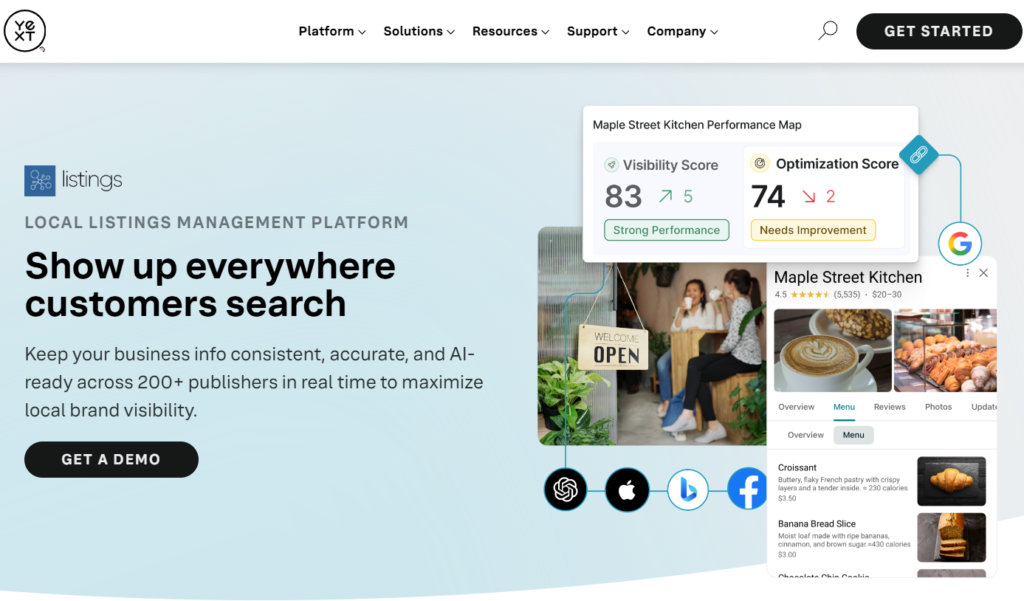
Yext offers a robust platform built for enterprise-level control. It centralizes structured data using a proprietary Knowledge Graph, helping brands maintain accurate listings across more than 100 platforms.
Top features:
- Voice assistant integrations (Siri, Alexa, Cortana)
- Real-time updates at scale
- AI-powered content and search
- Workflow permissions and compliance tools
Yext offers enterprise-grade listings control with its proprietary Knowledge Graph and voice assistant integrations. Yet, its steep pricing and complex setup can be a challenge for smaller teams. With Birdeye, businesses get enterprise-level automation and AI optimization without the high cost or complexity.
5. Uberall
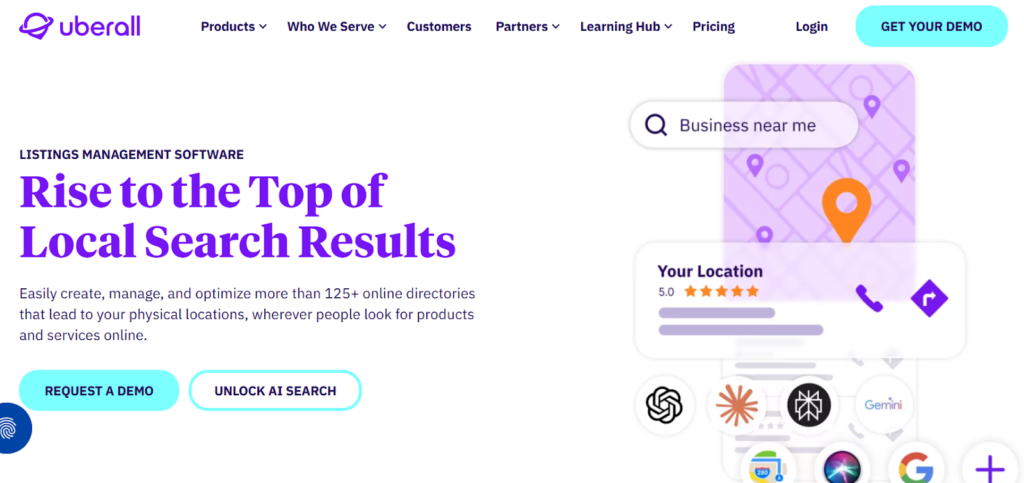
Uberall is tailored for franchise businesses and multi-location brands. Its tools enable centralized control while allowing individual locations to contribute local content.
Top features:
- Bulk listing edits and sync
- Voice search optimization via Alexa
- Reputation and review management add-ons
- Region-specific dashboards and permissions
Uberall is built for franchises needing centralized control and regional flexibility across multiple locations. However, its focus on large-scale enterprise users can make it overwhelming and less intuitive for smaller businesses. Birdeye combines that same scalability with a simpler, AI-powered dashboard suited for all business sizes.
6. Whitespark
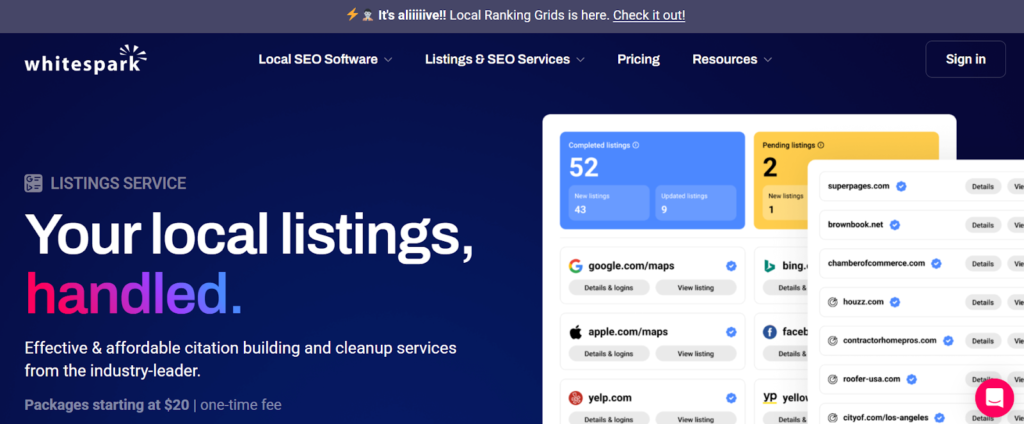
Whitespark takes a different approach, focusing on manual citation building and niche directory campaigns instead of real-time syncing. This makes it a favorite among SEO specialists working in specific industries.
Top features:
- Local Citation Finder tool
- Manual citation cleanup services
- Specialized campaigns for law, medical, and local service industries
- Transparent, pay-as-you-go pricing
Whitespark stands out for its manual citation building and hands-on support, offering a personalized touch for niche industries. But its slow turnaround and lack of automation make it impractical for high-volume management. Birdeye ensures instant updates and real-time AI monitoring for consistent accuracy across locations.
7. Advice Local
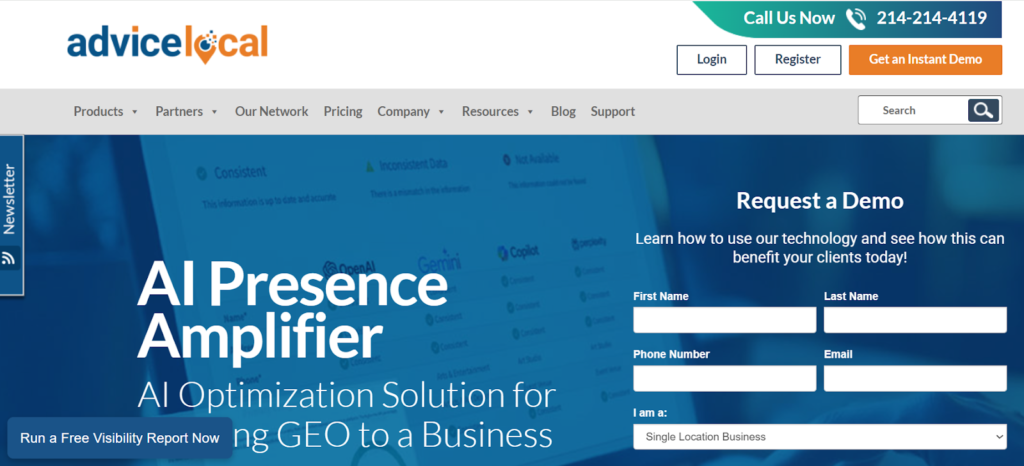
Advice Local is best suited for agencies and resellers looking to automate large-scale listings distribution. It offers both aggregator-based distribution and directory-level publishing.
Top features:
- Strong partnerships with data aggregators
- Reseller-friendly white-label platform
- Bulk updates via API access
- Optional manual citation services
Advice Local appeals to agencies with white-label options and aggregator partnerships for scalable listings distribution. However, its limited real-time data control and dependency on third-party aggregators can slow accuracy. Birdeye offers direct, AI-powered sync for faster, more reliable listings management at any scale.
8. Reputation
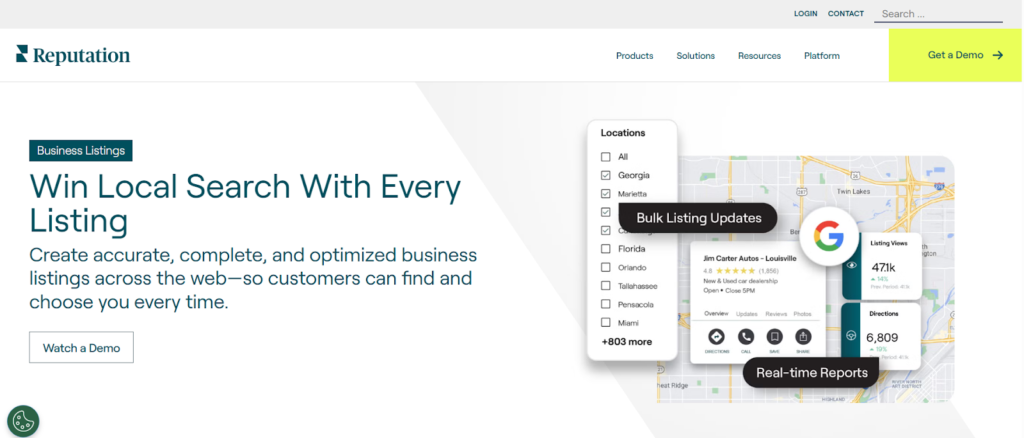
Reputation (formerly Reputation.com) goes beyond listings management by combining enterprise reputation management with location data accuracy. It’s tailored for industries where customer sentiment and brand trust are critical, like healthcare, retail, and finance.
Top features:
- Listings management across 100+ platforms
- AI-powered review monitoring and responses
- Multilingual sentiment analysis
- Feedback and survey integrations
Reputation combines listings, sentiment analysis, and review management for large organizations. Still, its enterprise focus and pricing make it less accessible for small or mid-sized teams. Birdeye delivers the same multi-layered visibility with easier usability and AI-driven efficiency across every customer touchpoint.
9. Semrush Listing Management
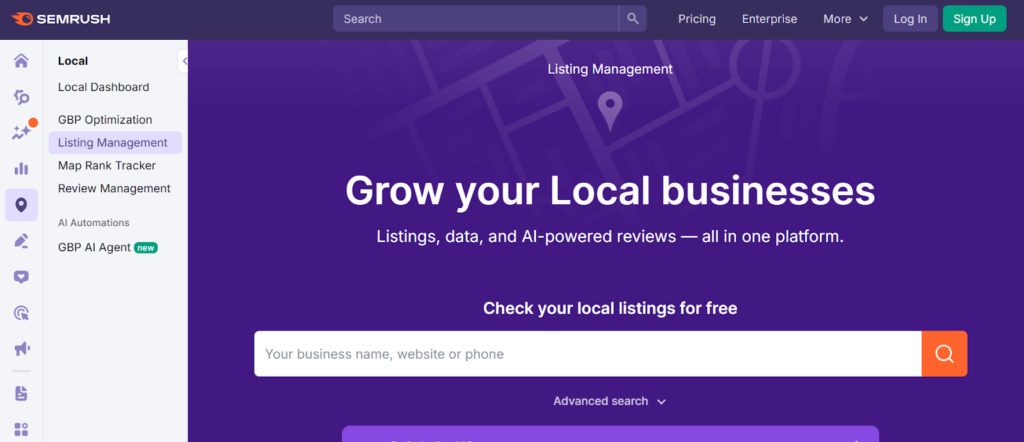
For those already using Semrush, their Listing Management add-on offers seamless local SEO integration. Powered by Yext, it enables visibility and performance tracking across all your business locations.
Top features:
- Listing sync to major directories
- Local visibility heat maps
- Position tracking for location-specific keywords
- Reputation monitoring through Semrush dashboard
Semrush’s listings tool is a convenient add-on for existing SEO users, enabling directory sync and local visibility tracking. However, it depends on Yext’s backend, limiting customization and direct AI automation. Birdeye offers native, AI-powered listings optimization with deeper control and faster updates.
10. Thryv
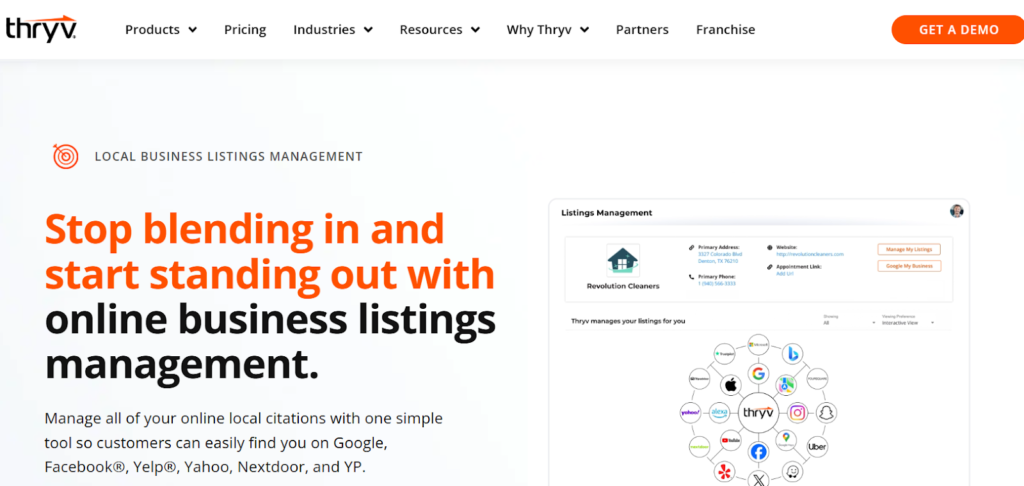
Thryv is an all-in-one business management suite built for small businesses. In addition to listings, it includes CRM, appointment scheduling, invoicing, and customer communication tools.
Top features:
- Listings management for core directories
- Integrated business tools (CRM, payments, scheduling)
- Reputation and review tools
- Client communication from a single platform
Thryv provides an all-in-one business suite that covers listings, CRM, and client communication for small businesses. But its broad focus can make listings management feel secondary and less advanced. Birdeye specializes in listings accuracy and AI automation, ensuring your business information stays consistent everywhere.
11. Synup
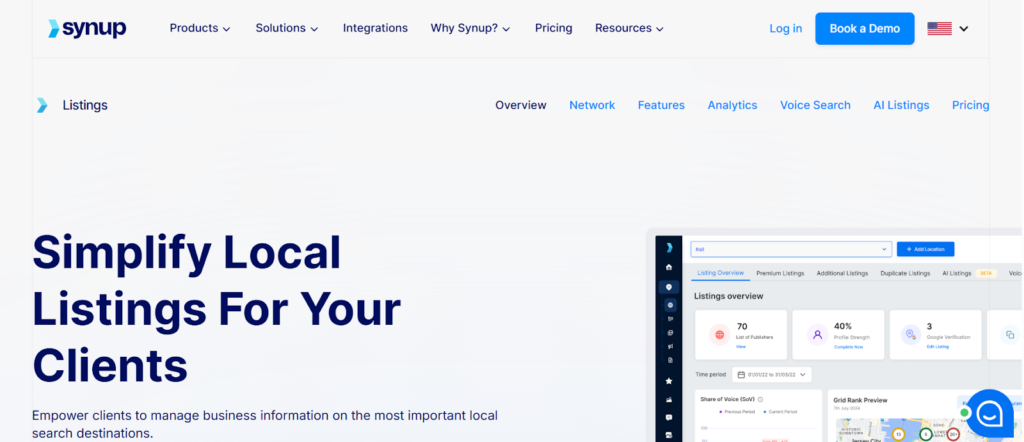
Synup combines structured data management with flexible publishing and deep analytics. It’s best for multi-location teams looking for customization and control over how business data is presented online.
Top features:
- Real-time sync across directories
- Custom schema markup support
- Widget-based reporting dashboards
- Social and review integration options
Synup supports structured data and custom reporting for businesses that need detailed control over their listings. Yet, it can feel overly technical for teams without in-house SEO expertise. Birdeye simplifies complex workflows with AI-driven accuracy and intuitive dashboards anyone can use.
12. SOCi
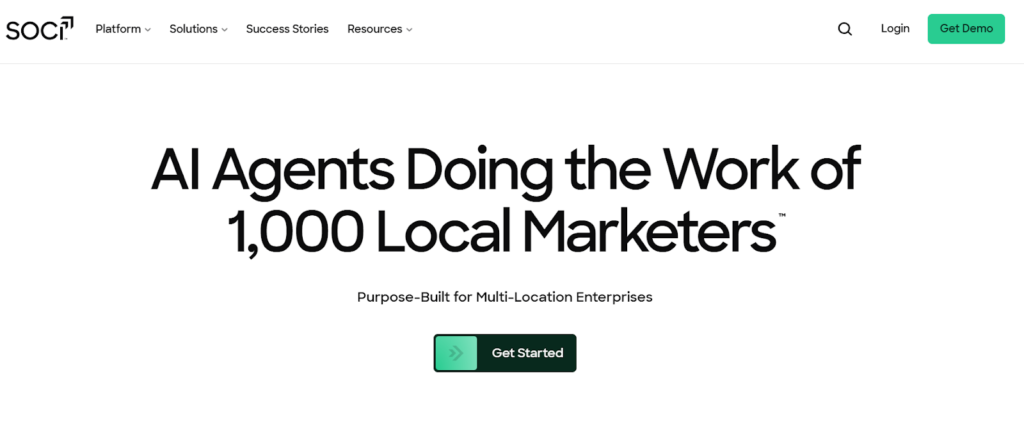
SOCi Listings is purpose-built for franchise and multi-location brands, with strong workflows for corporate governance, local control, and brand consistency.
Top features:
- Tiered approval workflows for listings updates
- Role-based access for local teams
- Compliance management tools
- Centralized dashboards for reviews and social
SOCi excels at managing franchise listings with role-based access and compliance tools. However, its layered workflows and enterprise pricing may not fit smaller brands. Birdeye delivers the same governance and brand consistency with a more accessible, AI-automated system.
13. Localo
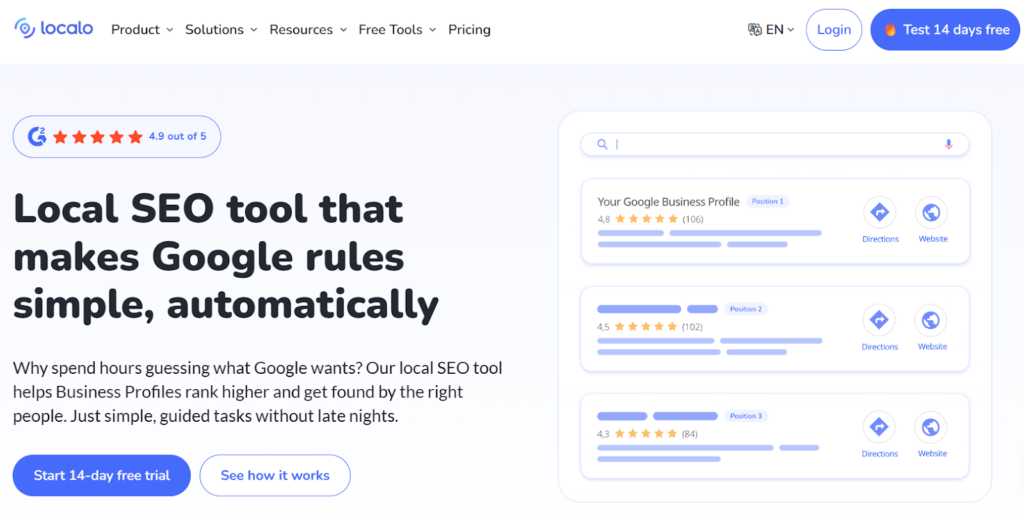
Localo is designed for local business owners and freelancers who want simple, AI-powered tools to grow their presence on Google. It focuses on core visibility tasks like Google Business Profile optimization and keyword tracking.
Top features:
- AI-generated Google Posts
- Local keyword tracking with heat maps
- Competitor comparison tools
- Easy onboarding and guided setup
Localo offers an easy setup and AI-generated Google posts, making it great for small businesses and freelancers. But it’s limited to basic Google optimization without broader directory coverage. Birdeye expands reach across 50+ platforms, powered by AI for smarter visibility and engagement.
14. LocalFX
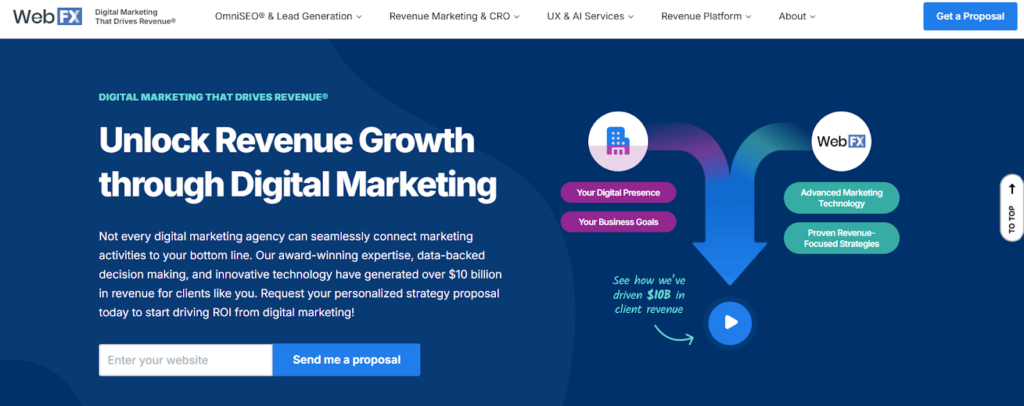
LocalFX is a proprietary listings tool developed by WebFX, built directly into their agency marketing ecosystem. It’s available to WebFX clients as part of their managed local SEO programs.
Top features:
- Listings distribution and sync
- Integrated review monitoring
- SEO and ROI reporting inside WebFX platform
- CRM and campaign alignment
LocalFX integrates listings, reviews, and reporting inside WebFX’s agency platform, providing seamless marketing alignment. However, it’s only available to WebFX clients, restricting access for independent users. Birdeye offers the same integrated insights and automation, open to all businesses and agencies alike.
15. ReviewTrackers
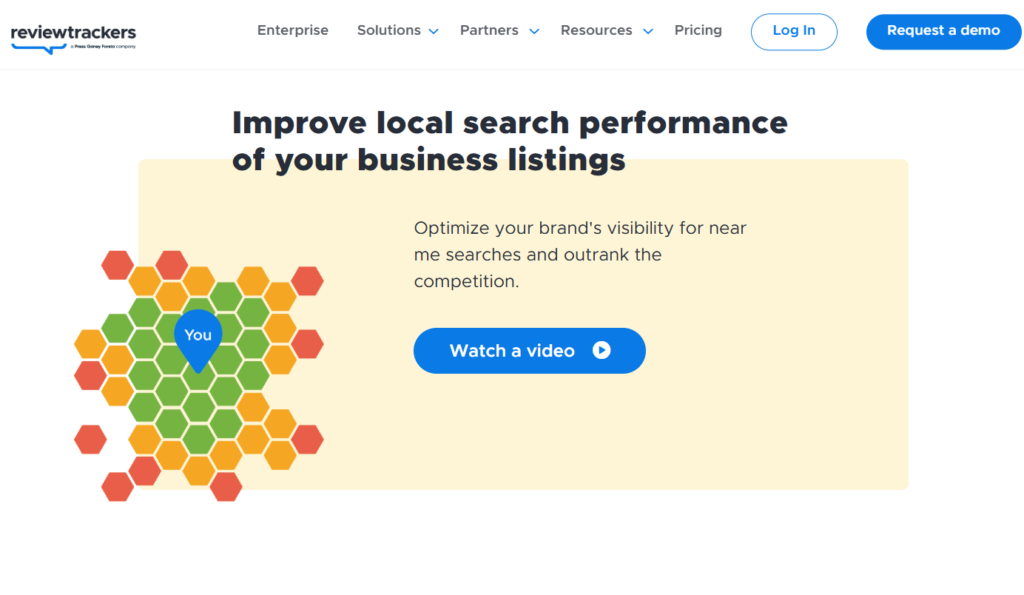
ReviewTrackers focuses on review aggregation and customer feedback, with basic listings capabilities to keep location data in sync. It’s built for teams that prioritize customer experience metrics and sentiment analysis.
Top features:
- Centralized review aggregation from 100+ sites
- Feedback collection and customer sentiment reports
- Listings sync to core directories
- Review response workflows
ReviewTrackers is ideal for aggregating reviews and monitoring customer sentiment across multiple platforms. But its listings capabilities are limited and lack real-time optimization. Birdeye brings together reviews, listings, and social management under one AI-powered system built for accuracy and growth.
How to choose the right local listings management tool
Choosing the right local listings management software in 2026 depends on your business size, location footprint, feature needs, and available budget. With dozens of platforms offering similar capabilities, it’s crucial to align your selection with your operational goals and local SEO strategy.
1. Identify your business size and location count
The first step is understanding the scale of your listing needs. A tool that works for a single-location café won’t necessarily meet the requirements of a 500-location franchise.
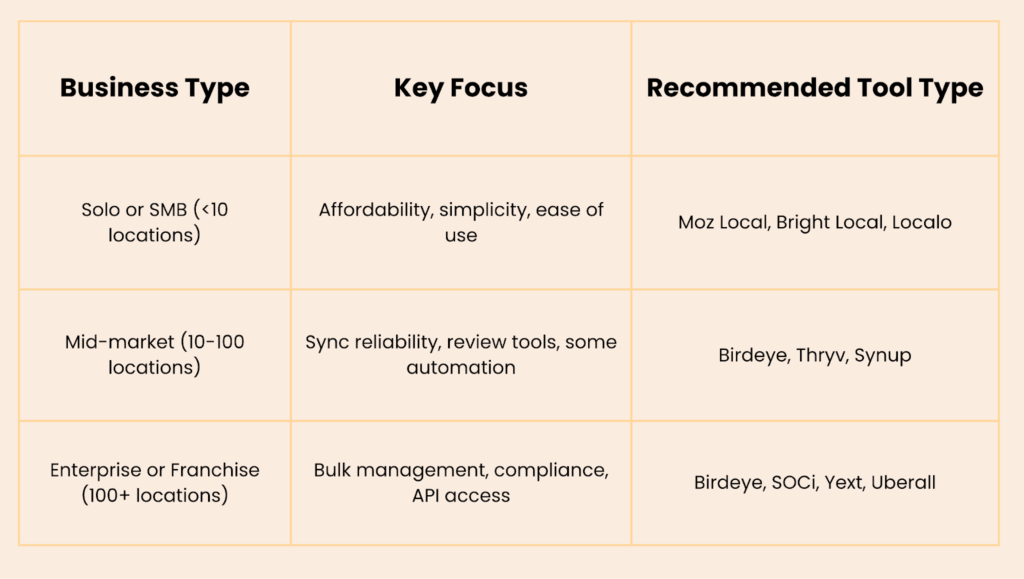
Pro tip: Create a simple matrix matching your number of locations to required features like auto-sync, reporting depth, and AI capabilities to narrow your shortlist quickly.
2. Set budget and prioritize core features
Listings management platforms vary widely in pricing. Establishing a budget helps you focus on tools that meet your needs without overpaying for features you won’t use.
Typical pricing tiers in 2026:
- Under $50/month: Ideal for SMBs; basic directory sync and some review alerts (e.g., Moz Local, Localo).
- $51–$200/month: Great for growing brands; includes reporting, limited automation, and review response tools (e.g., BrightLocal, Semrush LM).
- Enterprise/custom pricing: Supports 100+ locations, advanced automation, bulk updates, AI workflows, and integrations (e.g., Yext, Birdeye, SOCi).
Must-have vs. nice-to-have features:
- Must-have: Automated sync, duplicate suppression, Google Business Profile integration
- Nice-to-have: AI-generated review responses, social media tools, heat maps, voice search optimization
3. Evaluate support, integrations, and platform roadmap
A listings tool is not just software; it’s a long-term partner in your local visibility strategy. Consider the quality of support and technical flexibility before committing.
Key evaluation areas:
- Onboarding & support: Ensure the platform offers live onboarding sessions, email/chat support, and SLAs (Service Level Agreements), especially for multi-location brands.
- Integrations: Look for native or API integrations with your CRM, CMS, point-of-sale (POS), and tools like Zapier to automate updates.
- Product roadmap: Ask the vendor about upcoming features, especially around AI and voice search. Platforms actively investing in generative AI and voice integrations will help future-proof your local SEO efforts.
Final tip: Before you decide, schedule product demos, request case studies, and test usability with your internal team.
Frequently asked questions on the best local listings management tools for 2026
Listings management keeps your business info accurate across platforms, while citation building adds new mentions to improve local SEO authority.
Localo offers limited free scans, and Moz Local provides free audits, but full listings management requires a paid plan.
Most tools use automated detection to suppress or merge duplicates, helping prevent SEO conflicts and confusion in search results.
Yes, platforms track clicks, calls, and conversions, allowing you to measure local SEO impact and performance over time.
Yes, Birdeye and Uberall optimize listings with structured data compatible with Alexa, Siri, and Google Assistant for voice search visibility.
Birdeye: The AI-powered listings platform leading 2026
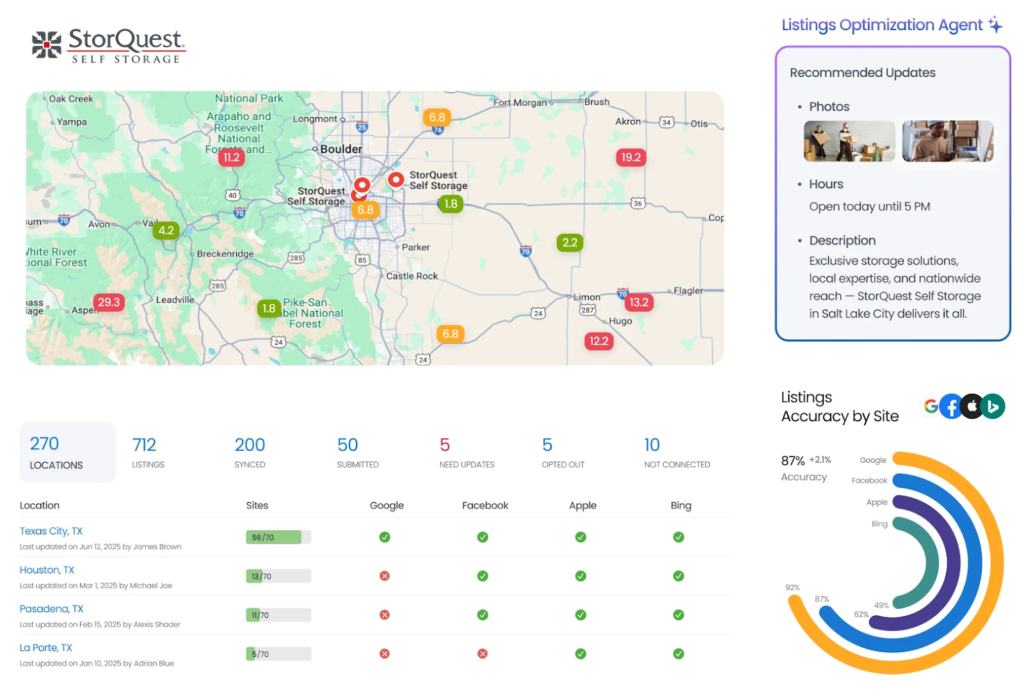
As local listings management becomes more complex and competitive, Birdeye continues to lead the space with its AI-first approach, delivering unmatched automation, accuracy, and scalability.
What sets Birdeye apart:
- AI-powered listings management: Birdeye’s Listings AI Agents monitor your business profiles in real time across platforms like Google, Apple Maps, Yelp, and Facebook. These agents detect gaps, enforce consistency, and automatically apply updates based on your brand guidelines, no manual intervention required.
- Real-time sync & duplicate suppression: With intelligent duplicate detection and automated suppression, Birdeye prevents NAP conflicts that can harm local SEO and confuse customers.
- Integrated reviews & social tools: Beyond listings, Birdeye combines review management, AI-generated responses, and social posting into one unified platform, giving your team full control over local engagement and brand reputation.
- Enterprise-grade reporting: Advanced dashboards offer performance analytics by location, region, or brand-wide. Track impressions, calls, clicks, and conversions to prove ROI and optimize visibility.
- Voice Search optimization: Listings are structured for compatibility with voice assistants like Alexa and Siri, helping you capture customers using hands-free local search.
With over 3 billion listing impressions and 200 million website visits driven annually, Birdeye is not just a listings tool, it’s a complete local growth platform for businesses that demand accuracy at scale.
Book a Birdeye demo and see how AI-powered listings can future-proof your local strategy.

Originally published









